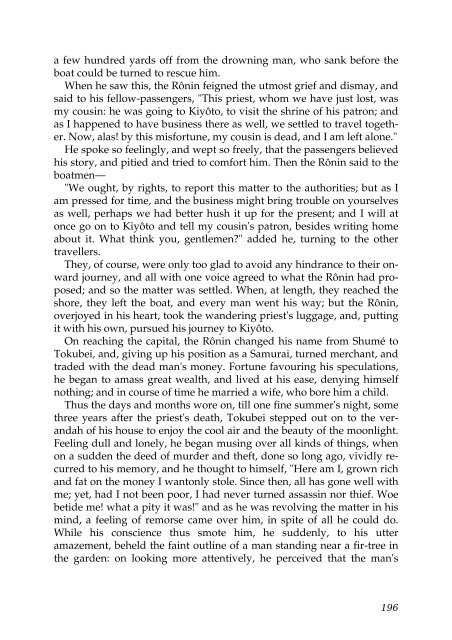Create successful ePaper yourself
Turn your PDF publications into a flip-book with our unique Google optimized e-Paper software.
a few hundred yards <strong>of</strong>f from the drowning man, who sank before the<br />
boat could be turned to rescue him.<br />
When he saw this, the Rônin feigned the utmost grief and dismay, and<br />
said to his fellow-passengers, "This priest, whom we have just lost, was<br />
my cousin: he was going to Kiyôto, to visit the shrine <strong>of</strong> his patron; and<br />
as I happened to have business there as well, we settled to travel together.<br />
Now, alas! by this misfortune, my cousin is dead, and I am left alone."<br />
He spoke so feelingly, and wept so freely, that the passengers believed<br />
his story, and pitied and tried to comfort him. Then the Rônin said to the<br />
boatmen—<br />
"We ought, by rights, to report this matter to the authorities; but as I<br />
am pressed for time, and the business might bring trouble on yourselves<br />
as well, perhaps we had better hush it up for the present; and I will at<br />
once go on to Kiyôto and tell my cousin's patron, besides writing home<br />
about it. What think you, gentlemen?" added he, turning to the other<br />
travellers.<br />
They, <strong>of</strong> course, were only too glad to avoid any hindrance to their onward<br />
journey, and all with one voice agreed to what the Rônin had proposed;<br />
and so the matter was settled. When, at length, they reached the<br />
shore, they left the boat, and every man went his way; but the Rônin,<br />
overjoyed in his heart, took the wandering priest's luggage, and, putting<br />
it with his own, pursued his journey to Kiyôto.<br />
On reaching the capital, the Rônin changed his name from Shumé to<br />
Tokubei, and, giving up his position as a Samurai, turned merchant, and<br />
traded with the dead man's money. Fortune favouring his speculations,<br />
he began to amass great wealth, and lived at his ease, denying himself<br />
nothing; and in course <strong>of</strong> time he married a wife, who bore him a child.<br />
Thus the days and months wore on, till one fine summer's night, some<br />
three years after the priest's death, Tokubei stepped out on to the verandah<br />
<strong>of</strong> his house to enjoy the cool air and the beauty <strong>of</strong> the moonlight.<br />
Feeling dull and lonely, he began musing over all kinds <strong>of</strong> things, when<br />
on a sudden the deed <strong>of</strong> murder and theft, done so long ago, vividly recurred<br />
to his memory, and he thought to himself, "Here am I, grown rich<br />
and fat on the money I wantonly stole. Since then, all has gone well with<br />
me; yet, had I not been poor, I had never turned assassin nor thief. Woe<br />
betide me! what a pity it was!" and as he was revolving the matter in his<br />
mind, a feeling <strong>of</strong> remorse came over him, in spite <strong>of</strong> all he could do.<br />
While his conscience thus smote him, he suddenly, to his utter<br />
amazement, beheld the faint outline <strong>of</strong> a man standing near a fir-tree in<br />
the garden: on looking more attentively, he perceived that the man's<br />
196



